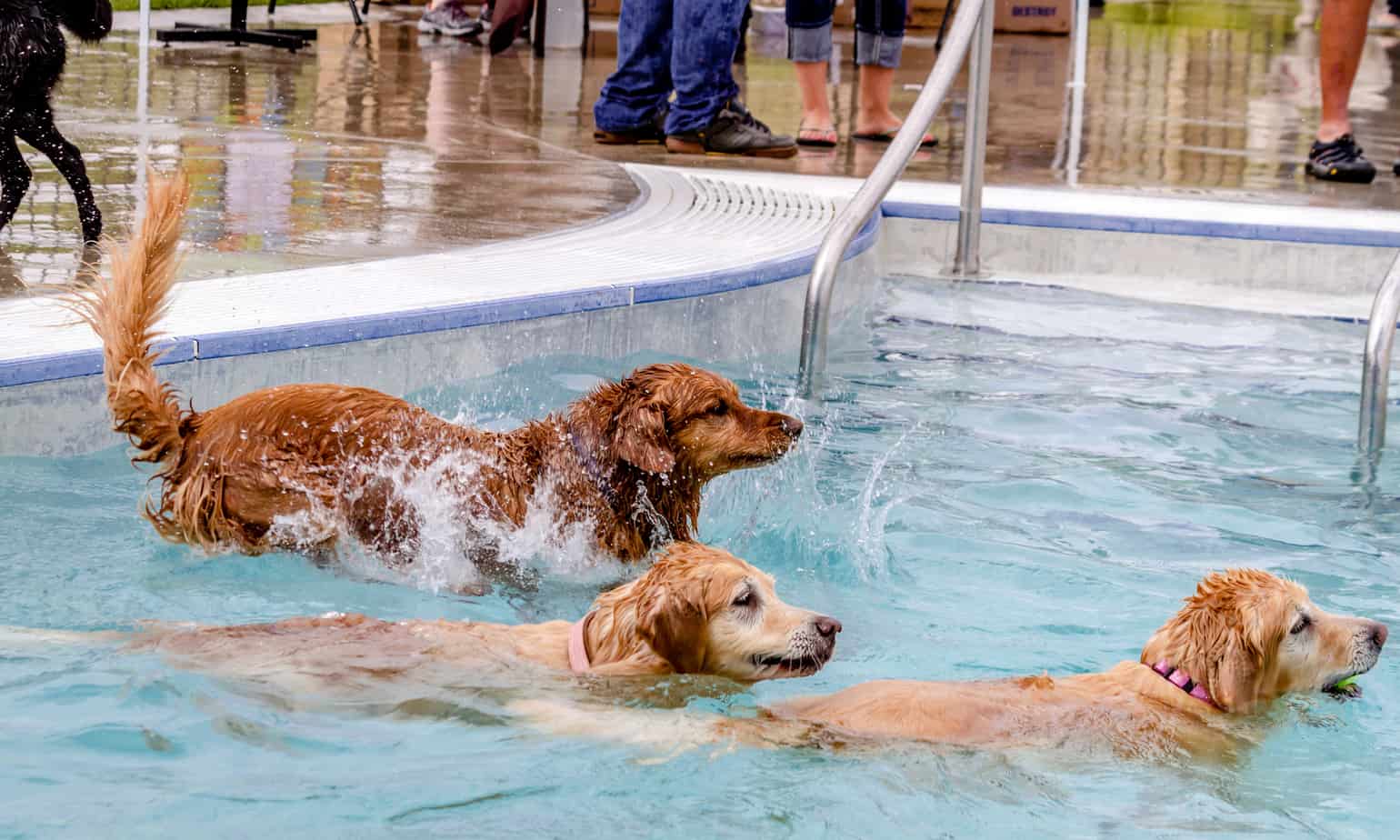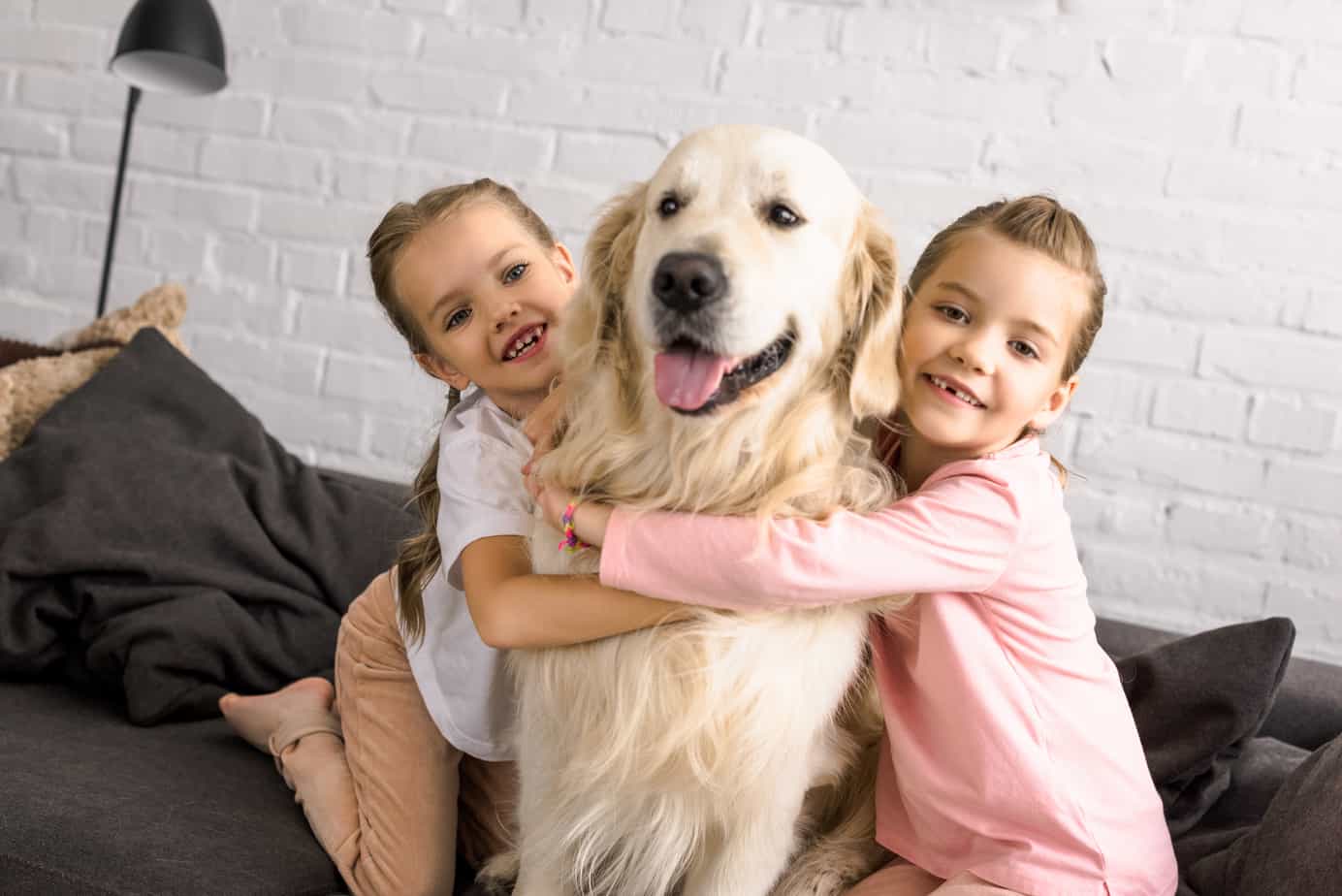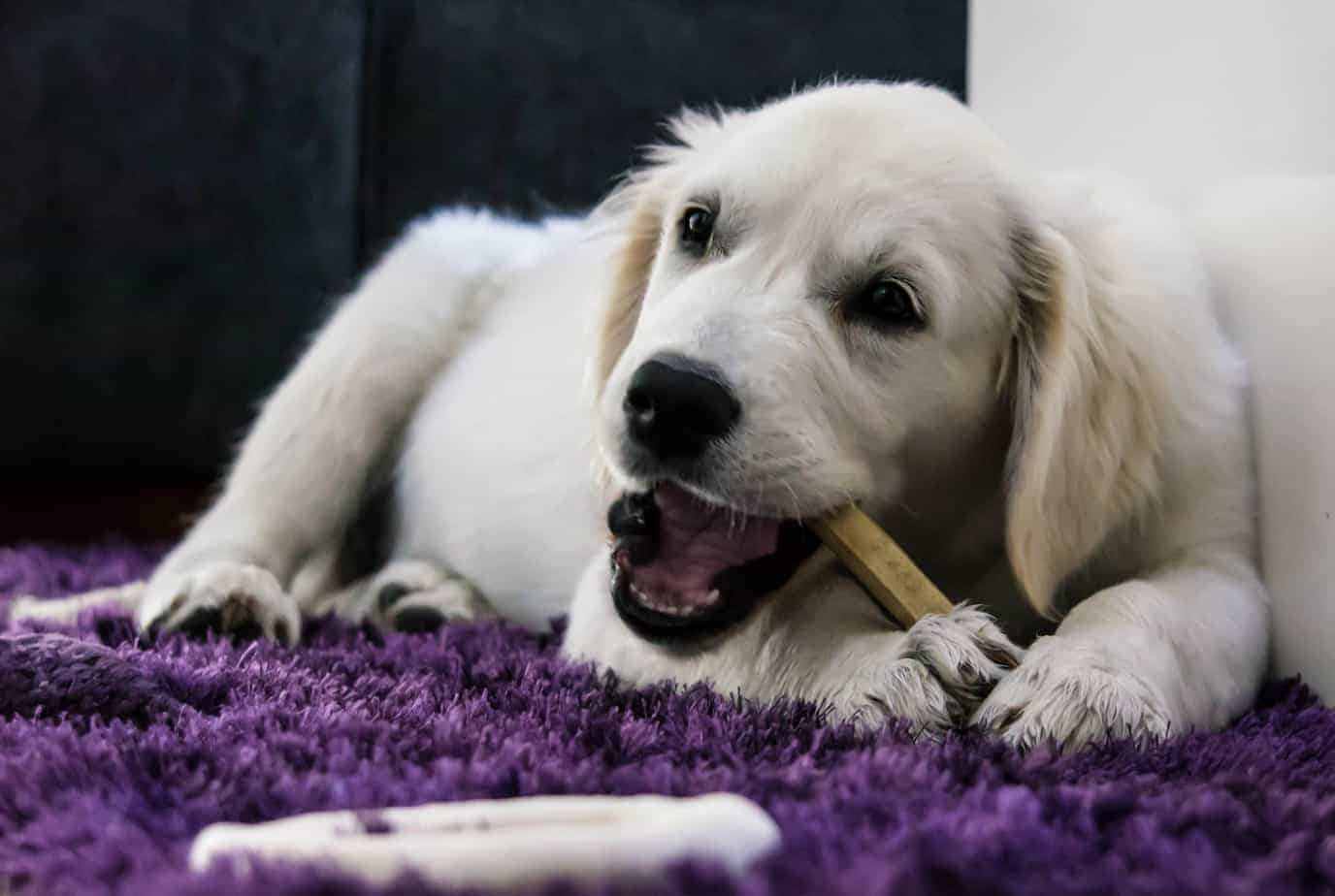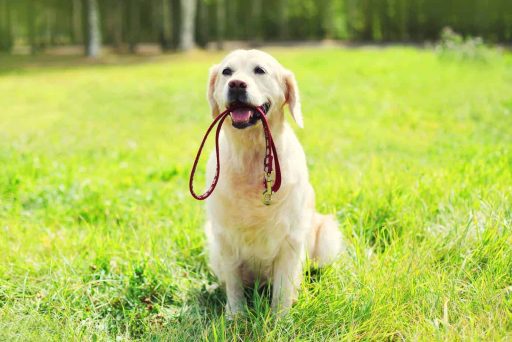Golden Retrievers, like any dogs, often exhibit attention-seeking behaviors. They are a sociable breed and love being around humans. These behaviors can at times be quite irritating and sometimes as dogs grow from being puppies to adults, these behaviors can in some cases become dangerous.
Why Is my Golden Retriever constantly seeking my attention? Attention seeking behavior can be caused by lack of exercise, lack of mental stimulation, a bad diet, lack of training as a puppy and sometimes illness. If your Golden Retreiver has been rewarded in the past for attention seeking behavior, then he’ll use it again to get what he wants.
Dogs love our attention. It’s a form of communication for them, a way for us to show our love and for them to feel loved. Some dogs crave our attention for other reasons, and it’s important that you figure out why your dog is constantly seeking your attention, especially if he hasn’t always behaved this way before.
Attention seeking behavior of dogs
It’s not just Golden Retrievers that can excessively seek attention, all dog breeds will do it at some stage.
Different dogs will display different attention-seeking behaviors. These can include the obvious signs such as barking constantly, howling, whining, nudging you, licking you and jumping on you.

Golden Retrievers love being the center of attention
Some breeds are more expressive and can try to get your attention in more creative ways such as trying to hand you their favorite toy or leash, staring at you, mouthing you, stealing objects and looking for you to chase him, stealing your seat on the sofa when you leave the room or refusing to move from your feet or lap.
It’s normal for a dog to try to get your attention. It’s how they communicate. It only becomes a problem when it becomes obsessive and affects you or your family negatively.
Why is your golden retriever always Seeking your Attention?
There can be many reasons why your Golden Retriever might be seeking your attention, and not all of them are bad or need to be fixed.
First, it is important to realize that dogs are pack animals. This means that they are social and need to be around you. Even if you have multiple dogs they all need some alone time from each other, and personal attention from you.
An important question to ask yourself is, are you actually giving your dog enough attention? Is his desire for your attention well-grounded? Think about your typical day for a minute.
Do you work full-time? Is your Retriever alone when you’re at work? Perhaps you also hit the gym before or after work. How much time is left in the day to spend with your dog?
Another very common reason why your Golden Retriever may be seeking your attention is lack of adequate exercise. A tired dog is a well-behaved dog. Maybe try taking two shorter walks a day instead of one, or doing some agility training could solve the problem.
It could also be that your dog is not getting enough mental exercise. Golden Retrievers are smart dogs and need a lot of mental stimulation to keep them happy, especially when they are puppys.
Too much mental energy is going to cause your dog to misbehave and seek more attention. Many dog breeds were bred to perform a certain job and this job would burn off mental and physical energy. Golden Retrievers were bred to retrieve waterfowl, a fairly intensive exercise. So, even if you are meeting your Golden Retrievers physical exercise requirements, you might not be providing him with enough mental stimulation.
If your Retriever suddenly starts to constantly seek your attention, then he may be trying to tell you something with this behavior. It could be a signal that he is in pain or discomfort. A visit to the vet is essential if you suspect that something is wrong physically with your Golden Retriever.
Why Are Golden Retrievers Needy For Attention?
Let’s look at the Golden Retriever breed history to understand them a little bit better. Why look at the breed history, you ask? Because certain breeds of dogs were bred to work more closely with humans than other breeds. When considering how attention-seeking a breed may be, you really need to take into account what they were originally bred for.
Most sighthounds and terriers were bred to work alone and they are much less likely to display attention-seeking behaviors. On the other hand, most toy breeds were bred to be companion animals and they are much more likely to seek their human’s attention.

Golden Retrievers love to exercise,especially swimming
The Golden Retriever was originally bred to be a retriever gun dog in Scotland. A gun dog is a dog that retrieves the fallen prey for his hunter. A hunter and a gun dog work together out in the field all day and this is both physically, and mentally taxing work for the dog.
So, how does this help us understand the reason why your Golden Retriever is seeking your attention? Two main reasons. The first is that the Golden Retriever was bred to work with a human all day long and as such, there is an innate desire to spend time with a person. Second, the Golden was bred to work in the field all day, running, flushing, swimming, walking, sniffing, retrieving and so on. This means that he has a lot of energy and needs to burn it off in other ways such as a long walk or even a swim, if he is no longer a working dog.
Is your golden retriever misbehaving for attention or For Treats?
If your Golden Retriever is getting all of the physical and mental exercise that he needs, but is still acting out and looking for your attention, then something else must be going on.
Sometimes the attention seeking behavior has actually been caused by the owner and the dog is simply responding to your behavior. It could be that you have inadvertently encouraged this behavior, especially if you have had your Golden since he was a puppy.
Something as simple as praising or giving attention to your puppy at the wrong time can start you down the path to attention seeking behavior. Or perhaps when he was a puppy you trained him to perform a trick like ‘shake hands’ in return for a treat. Now as an adult dog, he paws at your hands all the time looking for a treat. What is cute as a puppy is not always cute when the dog is an adult.
With a puppy, you should always ask yourself “do I want my adult dog to do this?” It’s cute to have a tiny puppy jump up on you. But not so much when your full-grown, 75 pound Golden Retriever jumps on you or your kids.
Is your Golden Retriever seeking attention as a show of affection?
This is probably the most obvious reason that a dog seeks your attention. In your dogs eyes, you Are AMA-ZING! I mean think about it for a second. All the things that you have done and accomplished in life, you deserve a round of applause. That’s all your Golden Retriever is trying to give you, the adoration and love you deserve!

Most Golden Retreivers love affection and attention
Think about it from your dogs perspective. You are the one who holds all the good in his world. You have the food. You have the treats. You open the door to the outside. You take him for walkies. You take him to the dog park to see other doggie friends. You brush him. You snuggle him. You play with him. You give him new toys. You communicate with him through training. You are all that is good in his world! Certainly, if you were him you would seek your attention too.
Is your golden retriever Seeking good or bad Attention?
Dogs will seek your attention whether you think of it as bad attention or good attention. Good attention is praise, pets, going outside, and cookies. Bad attention is you yelling at him for stealing your phone, again, or whacking him with a newspaper. You can see a different one is positive and one is negative. One is meant to encourage while the other is meant to discourage the behavior just previous to the attention.
Dogs have a tendency to view any attention as attention. It is neither good nor bad. It is simply attention from you, which is why they did what they did. It is important to bear this in mind, even if you think you are punishing your dog he just sees it as the attention he is seeking.
What should you do before you Try To Stop attention seeking behavior?
It is always best to first make sure that your Golden Retriever is getting enough of your attention and enough mental and physical exercise. Try increasing exercise and see if that helps.
1. Try extra exercise and training
Perhaps add on more activities such as agility, urban herding, or canine freestyle. Canine sports are a great way to burn lots of mental and physical energy. If you want to be really ambitious, you could also train him to help you out around the house, like switching lights on or off for you, fetching the mail, or fetching your phone for you.
2. Try changing his diet
It is also worth a mention that a change in diet can help too. If your Golden Retriever eats a dry or wet food, you should double check that it doesn’t contain any nasty ingredients that could affect his behavior.
Cheap dog foods can contain lots of additives and cheap ingredients that can affect how a dog behaves. A food sensitivity can also cause your dog to seek more attention or act strangely, especially if it is making him ill. So, switching up your dog’s diet might be a good idea.
Indeed, some attention-seeking behaviors are centered around a desire for food. This can also be diet-related. Food high in carbohydrates have a tendency to tell the brain that it is still hungry. This is true for dogs too. So, feeding a diet that is very low or no carbs could be very helpful. Raw diets are typically very low in carbohydrates. In addition, a raw diet that has raw meaty bones in it is a great way to provide another outlet for mental and physical energy.
How To Stop Attention Seeking Behavior in Golden Retrievers
There are several different options to help redirect and stop attention-seeking behaviors. If the behavior has been going on for a while, then it can be difficult to correct. I’d recommend hiring a dog trainer for a few sessions if you can’t get to grips with it by yourself.
1. Ignore the Behavior
One option to reduce attention-seeking behavior is simply to ignore the behavior. Do not look at the dog, do not talk to the dog, do not scold or punish the dog. Simply continue what you’re doing as if the dog is not there. This can be tricky because the dog will usually escalate the behavior before he gives up. He will bark louder and more intently. He will paw at you harder. If you give in you are telling the dog that an intensified version of the behavior will get a response.
2. Isolate the behavior
If you cannot ignore the behavior, leave the room and go where your dog can not follow. If your Golden Retriever tries to climb in your lap as you work on your laptop, stand up and leave the room. You can close the door or have a child gate up. Leave the room without the dog. Once the dog has calmed down, return, call the dog to you, have him do a trick, and then give him praise and a treat. This will show the dog that you still love him, you simply do not like his behavior.
3. Teach an alternate behavior
It can also be a good idea to train the dog to do an alternate behavior. One that you want your Golden Retriever to do, one that you want to praise him for. This could be training your dog to sit instead of jump on you. Or to “shush” instead of bark. Or to go to his bed or create instead of trying to sit on your lap.
This can be a great way to get your dog to do something else. The more you reward the behavior you want to more your Golden will start to do that instead of the attention-seeking behavior that annoys you.
4. Create a repetitive schedule
Something else that can work well is to have a schedule. Dogs love a repetitive schedule. For instance, always work on your computer after you go for your first walk of the day. During that time give your dog a stuffed Kong or another thing to chew on. This will give him something to do while you work.
If he tries to bother you after he finishes his chew, ignore him. Once you are done on your computer take a break, let your dog out to potty (only if he is not trying to get your attention). Then go for your second walk or play session or agility training session. After that, you can give your dog another chew or stuffed Kong while you work on making dinner or return to your computer.
Keep it consistent. When you work on your computer, let your dog know that you are not going to be distracted by him. Eventually, when you head to your computer he will settle right down and not bother you.
Having a schedule is actually a really great preventative strategy, something that should start when your Golden Retriever is a puppy. If he knows from a young age that computer time means you aren’t going to pay attention to him, he won’t try to bother you while you are on your computer later in life.
It can be anything though, not just computer time. It could be when you are cooking or working out or when you are working on your art. You make the schedule so you choose when it is and is not appropriate for your dog to disturb you. This can be a great time to crate your pup. Once he is older you can replace his crate with a bed in the same place and you may find that he’ll retire to his bed without you even having to tell him.
5. Teach your dog to play by himself
You can also help to teach the dog to entertain himself. Provide him with stuffed Kong, treat-filled puzzle toys, or small boxes containing treats around the house. This will provide him with distraction and mental exercise. Plus, it is something that he can do without needing your attention. Be sure to give him the Kong or other distraction before he starts to seek your attention. If you provide the distraction after he seeks your attention he will learn that he gets a distraction if he bothers you.

Bones and chew toys can be a great distraction for over active dogs
All of these options work best if you can recognize the times that your dog is doing what you want him too. Reward him and praise him with your attention when he is doing something you want him to do. Perhaps he is sitting quietly next to you instead of barking, praise him for that.
Maybe he is laying quietly and not pawing at your leg. The pawing is obviously more noticeable, but you need to praise him for laying there. A behavior that is rewarded is more likely to be repeated. So reward the behaviors you want your Golden to perform more often.
Sometimes you will need to get some work done and you can’t be distracted with trying to ignore your dog. This is where management comes in. Instead of working on training you will simply crate your dog or put him in another room. This will not be effective long term but it can help in a pinch.
If you consistently work with one or a combination of the above strategies you should see improvements. Remember this might take some time. He did not develop the attention-seeking behavior overnight so it makes take some time to undo. However, if you feel that you are giving it your all and you aren’t seeing the improvements that you want it may be wise to seek the help of an animal behaviorist or a trainer experienced in such matters.
Summary – Why would a Golden retriever constantly seek your attention?
There can be many reasons why your Golden Retreiver is constantly Attention seeking. This behavior can be caused by lack of mental and physical exercise, cheap dog food, a lack of proper training as a puppy and sometimes illness.
To stop the behavior you have several options, however, they have some common principles. The main principles to remember are: reward the behaviors you want and ignore the behaviors you don’t want. Remember even negative attention counts as attention to a dog.





